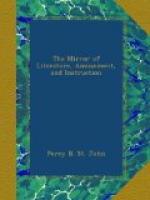Sturminster. Colbourne.
* * * * *
PARLIAMENTARY SCRAPS.
(For the Mirror.)
Lord Coke, in his fourth institute, defines certain qualities essentially requisite to constitute a good member of parliament; and he refers to a parliament roll, 3 Henry VI., which affirms that a parliament man should have three properties ascribed to the elephant—1. That he hath no gall; 2. That he is inflexible, and cannot bow; 3. That he is of a most ripe and perfect memory.—1. To be without malice, rancour, heat, and envy;—in elephante melancholia transit in nutrimentum corporis: every gallish inclination, if any were, should tend to the good of the whole body—the commonwealth. 2. That he be constant, inflexible, and not be bowed, or turned from the right, either from fear, reward, or favour; not in judgment respect any person. 3. That in remembering perils past, dangers to come may be prevented.
To these, addition is made by Lord Coke of two other properties of elephants: the one, that though they be maximae virtutis et maximi intellectus, of great strength and understanding, tamen gregatim semper incedunt, yet they are sociable, and go in companies; for animalia gregalia non sunt nociva, sed animalia solivaga sunt nociva: sociable creatures that go in flocks or herds are not hurtful—as deer, sheep, &c.; but beasts that walk solely or singularly, as bears, foxes, &c., are dangerous and hurtful. The other property is, that the elephant is philanthropos, homini erranti viam ostendit. And, in the opinion of Coke, these properties ought every parliament man to have.
Neither the ancient nor modern election statutes mention, or imply, the existence of a “candidate.” The old laws direct that the representative shall be freely and indifferently chosen by the electors. The choice was of their own motion, and the person elected was passive. Even at the present day, the law does not contemplate his asking for votes, and therefore does not allow, after the issuing of the writ, sufficient time for a regular canvass. The term “candidate” had its derivation from the person being candidatus, clothed in white, as symbolical of the wearer’s purity.
James I. issued a proclamation, in which the voters for members of parliament are directed “not to choose curious and wrangling lawyers, who seek reputation by stirring needless questions.”
At the Sussex election, in 1807, an elector, named Morton, voted in right of his patrimonial land at Rusper, which had been in possession of his ancestors 750 years.
W.G.C.
* * * * *
SONNET
TO AN EOLIN HARP, HEARD AT EVENING.
(For the Mirror.)




